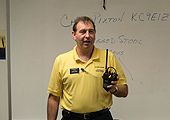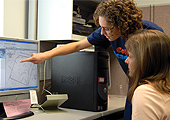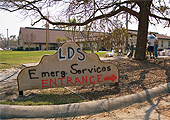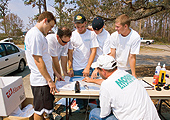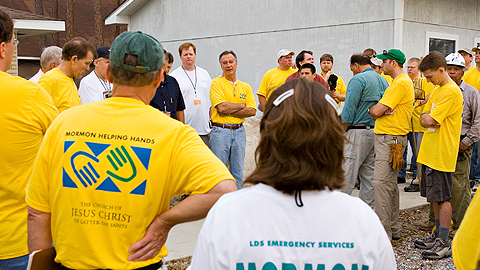
Emergencies often lead to a sudden, drastic increase in the needs in your area. In such situations, it may be difficult to know what to do, what should be responded to first, and how to organize disaster relief. This section identifies activities that address the short-term, direct effects of a disaster. The links on the right side of the page provide resources and forms that will help you as you coordinate the emergency response in your area.
1. Take care of your family first.
2. Follow the instructions of government leaders for evacuations and other emergency orders.
3. Respond to needs (especially people with special needs and first responders in the community).
- Bishops should apply welfare principles in ministering to members.
- Church members should be encouraged to assist neighbors with immediate needs and inform Church leaders of additional needs.
4. Assess the impact of the disaster, and report your assessment to your ecclesiastical leader and the area welfare manager.
- Full-time missionaries—Are they safe and accounted for?
- Church members—How many injuries or deaths? How many member homes are damaged or destroyed?
- Church buildings—What kind of damage has been sustained?
- Community—What are the overall effects on the community, including the infrastructure (power, water supplies, communications, and so on)?
- Anticipated needs—Is there a need for volunteer assistance from other wards and stakes or materials or other support from Church headquarters?
5. Establish communications.
- Establish a schedule for communications (mass texts, email, or conference calls).
- Determine how local Church leaders and other members will receive information about Church response efforts.
- Activate emergency communications if necessary.
6. Determine if an emergency operations center is needed (may consult with Church headquarters).
7. Organize work crews for disaster cleanup, and involve other stakes as needed.
8. Consider using Church meetinghouses for the response.
9. Determine whether help such as funding, clean-up supplies, food, or water from Church headquarters is needed. Contact Area Welfare Administration (801-240-0450) for guidance.
10. Manage offers of help from others, such as government and other emergency response organizations.
11. Keep the media informed of the Church’s response.
12. Respond to community requests for Church assistance with volunteers, and recommend approval of commodities or cash for community organizations.
13. Ensure that all requests for reimbursement for local expenses are submitted to Church headquarters.
